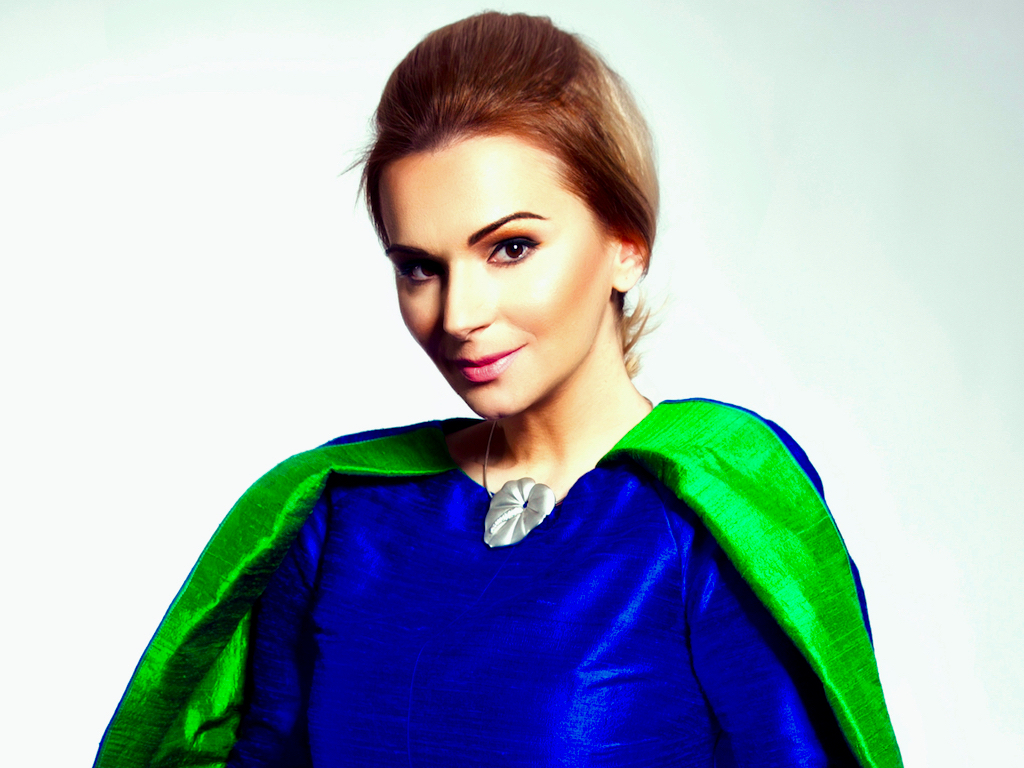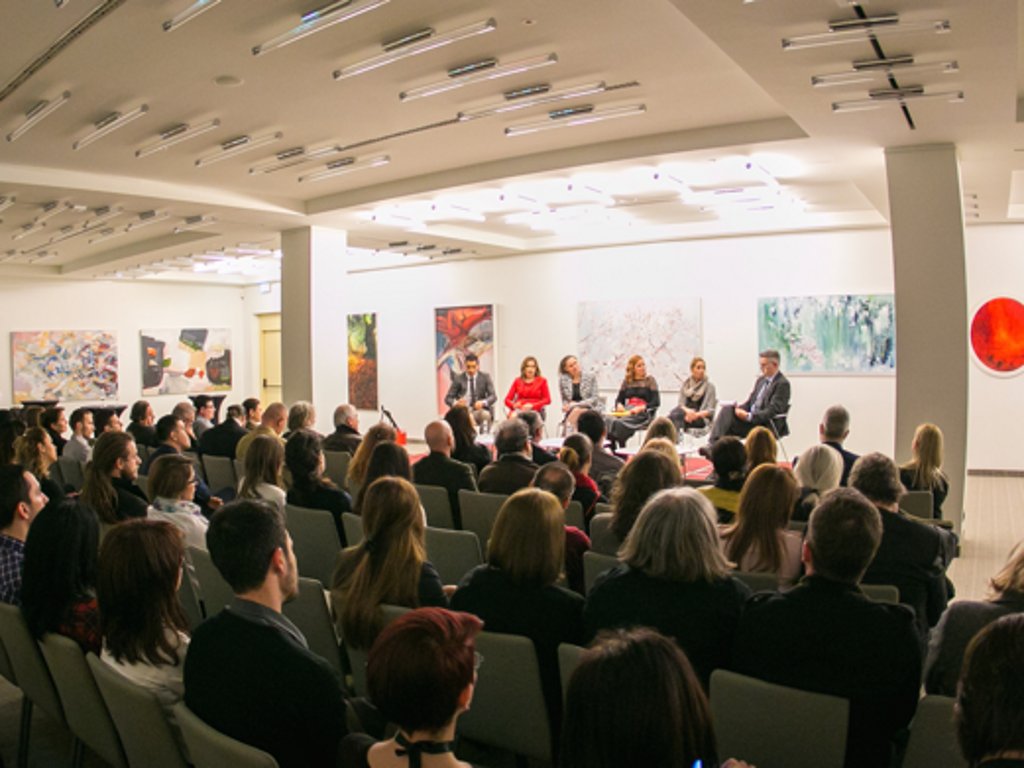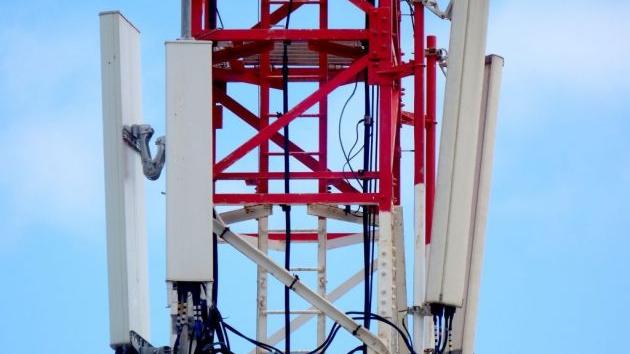Gordana Tomic, painter and director of Art Parlament – A person’s native traits will always come through
 Tuesday, 02.05.2017.
Tuesday, 02.05.2017.
 22:14
22:14

Her work has been exhibited in both Manhattan and the far Orient, she’s interested in the Buddhist philosophy of Zen, she has traveled around the world, and now she is running an art-business company, using her business experience from the West, through which she aims to support and enhance companies’ operations and the development of the contemporary art scene.
eKapija: Having acquired an MA and being an economist and consultant with considerable experience, at one point you decided to make painting your primary profession. It seems that your artistic inclinations were waiting for the right moment to come to the fore. How did all this transpire?
– I believe deeply that what we are in essence is what we carry in our genes and that we can’t resist our primal urges to realize ourselves. In my life, there wasn’t a button I could push to enter the world of art. That world has always been my world, but not always so publically and transparently, as I was educated in other fields. In line with my upbringing, I was supposed to turn my education into my career and I spend a little over a decade in IT and management, but I stayed in the art world as well, and it was only a question of time when it was going to become dominant and visible. Even though thoroughly oriented towards human essence, art is a public activity, as artists feel the need to step forward, express themselves and convey a message. I express myself visually, through colors, and in the moment it became my profession, I merely surrendered myself to this wonderful world.
eKapija: I’d call this courage – to follow your dreams and let the passion pour forth.
– It must be courage. Sometimes, when I’m writing my CV for art contests or catalogues, stating relevant data while excluding an entire previous career, I realize that it was courage. I’m then tempted to exclude all pieces of chronological information or information about my experience, and merely write “descendant of rebel heroes” (laughs).
eKapija: Looking back, are you proud of it now?
eKapija: You have worked in ICT so far, a strict and clearly defined management and consulting system. What are your experiences from this period and what valuable lessons did you learn?
– The development of my career had its highlights, but to me they never had anything to do with business results or numbers, though there were such moments as well. Instead, the valuable moments had to do with understanding people and surroundings, making a contribution and helping individuals or contributing in a wider, more metaphorical sense. This is certainly the biggest benefit of my business experience and work in the ICT sector.
I started earning very early, when I was sixteen, through awards at competitions and poetry contests and also through helping in the family business and I haven’t stopped earning since. I worked as a radio host throughout my studies. I graduated from the Faculty of Economics and got my MA there as well, and I got a job only 7 days after graduation in a good local IT company, which was very strong and promising at the time. I was their grantee and I honestly loved my job. I was managing foreign partnerships and projects and I had the impression of being a part of those foreign companies, vendors. I spent a lot of time acquiring further education through various courses, but also learning through their procedures. I made progress, step by step, from an intern to a marketing manager. Later, as a consulting manager, I was part of international teams and events in a true international environment localized through the local implementation practice. It all had its advantages, because it teaches you how to harmonize between the two real worlds within yourself. I always say – if I hadn’t been there, I wouldn’t be here.
eKapija: Why did you decide to study economics, what made you opt for it?
– Due to my talent for natural sciences and arts, I had to follow a multidisciplinary path, which was a bit of a double-edged sword for me as I found it hard to make a choice sometimes. I even attended two faculties and, at one point, I noticed I had two passports, two professions and so on. I’m really not one of those who know at any moment what they want exactly, which is maybe not a good thing to say for oneself. But I’ve been lucky in that there haven’t been great consequences so far, and I also keep in mind the Biblical parable of not burying one talent in the ground. At that stage of my life, economics was an interesting choice, along with physics, and I really wanted to learn about resource management in an organization on a micro level, but also about the postulates of how the economy functions on a macro level. Later, in my magisterial studies, I focused on IT and the epilogue was, in a way, expected, though not easily available.
eKapija: Knowing what we want is a question we always ask ourselves. How did you discover what you wanted?
– There are entire religions dealing with “Who am I?” and “What do I want?”. It’s not easy to recognize, it’s a crucial question – what makes me happy and what it is, by itself, outside the correlation with the environment and the circumstances. I’ll probably lose some joy of life once I fully discover that. It’s still a current question for me and I think it’s ethical for people to question themselves.
eKapija: How did you spend your childhood? Psychologists say that it defines us for life.
– I believe in this. I even use it as reasoning for many of my current actions. I like to explore those sentiments and find a deep meaning in the period when one’s personality is formed. I am always very grateful for the family postulates and values we still share. I had a beautiful childhood in a cosmopolitan family, a family of intellectuals. A big and harmonious family is my personal example and the reason why I’ve always possessed team-readiness in my work, as well as the desire to share it with people and to help. I was probably never the type to assert myself, to be too ambitious and to prove myself, as you never get a chance to do this in a household with four children where you are taught that you are all equally worthy and that there’s room for everyone’s personal qualities, without anyone pretending to be the winner. I can find the roots of my personal and artistic style in my childhood, as I see neither business nor art as a competition.

eKapija: You once said that you wouldn’t be yourself without your business experience and that it had given you perspective and an ability to discern what’s important and what isn’t. How do you see yourself now that you’ve enriched your life with painting?
– In my company, I’ve now established some business and market elements for strategically fortifying art in the market, which is something that this environment used to lack. In fact, I’ve applied the basic rules of business development and introduced a range on innovations. I can say that strategic creation of services and products, market penetration, and even presenting our artists’ works through the business Artoteka has many similarities with marketing or sales and is the most similar to project-management, which I used to specialize in. All the innovation and creativity in making Art Parlament products in other field as well, in other industries (banking, real estate, HR creative motivation programs etc) show that it’s possible to implement art as support to business, to apply its beauty and power and, as much as possible, build something by taking the long view, which I am probably capable of doing thanks to my previous business experience.
eKapija: When and how did you know it was time for you to found Art Parlament?
– Art Parlament was created due to the need to balance between art and business and to provide truly modern and active artists with a place where they can be given equal opportunities as other professionals. There’s a lot of room for development there locally. Before Art Parlament, I tried my hand at running a personal gallery using a pretty simple B2C concept at the moment I decided that my work shouldn’t be displayed in galleries-gift shops, which people call galleries, even though they are not true market representatives of our contemporary art, with a few exceptions. There are so many brilliant artists not present or known in the local market for numerous reasons, mostly not good or even banal, as mostly rigidly predefined market forms are present here.
As I can say that I know the corporate world fairly well, I acquired knowledge and skills and invested them in the management, and it was therefore logical to develop a B2B concept. Aside from aspects of trade and collecting, it’s as if art is non-existent in the corporate world. Everything that happens in the art business happens in the field of mere commerce in ad-hoc situations, and business-to-business is therefore an area with great potential for local development. I upgrade everything close to me professionally on the level available to me – expert work with my team, through Art Parlament.
Art Parlament is patiently forming entirely new market products in other industries as well, through good strategic partnerships, where a sophisticated contribution is made to both artists and the local business in various industries and on various levels of organizations, where this need is recognized as something that should be met by the current art scene. This is an entirely separate art business, complementary to everything else, but with unique programs, such as, for example, renting valuable artworks to HR-aware and socially responsible companies, which care about their employees. The feedback has been tremendous, indicating that there has been a real need for this.
eKapija: What do your days look like when you’re creating? How do you arrange your environment while you’re painting?

I’m always inspired and don’t have to wait for inspiration. My current work is largely also a mental process, especially in the phase of studying the Zen philosophy, where 80% if observations, experience, and 20% is creation itself. This is partly a paradox as well, as the immaterial needs to be presented through its opposite, a minimum of technical materialization in the use of color.
eKapija: Is art a way of escaping everyday life for you?
– You could say so, but it sounds too clichéd to me. We’ve been running away from everyday life too much, so it doesn’t seem like an intimate, exclusive place to me, especially here, in this environment. To me, art is everyday life, my basic need. I believe that contemporary visual art is at this point the only field within which humanity can still develop, that is truly contemporary in 2017. Some other events sometimes seem to be frozen in time.
eKapija: Have you ever been hurt by criticism? How do you take it?
– It affects me in a good way, this kind of separate art of “art interpreters”, art critics, who act as demystifies. Art criticism can be complimentary when critics have something good to say about you and your work, but it can be bad as well. A great local painter has taught me that neutral criticism is the best, whereby you can’t immediately call it either good or bad, but factual and analytic instead. That kind of criticism can help the audience understand the artist’s personality and work better and let it decide for itself whether it’s good or bad, because the audience is sometimes competent and sometimes not, which doesn’t mean it shouldn’t make its own decisions. The kind of criticism I respect the most and which affects me the most comes from those who can see, understand and our capable of describing the emotion of the work and its creator. I have been encouraged by such people, among which are great authorities such as Zdravko Vucinic, Dejan Djoric, Olivera Vukotic, Dragan Jovanovic Danilov, Maja Skaljac Stanosevic, Ljiljana Karadzic and others. I have been fascinated to find that they’ve discovered something new in my work.
Zdravko Vucinic was the first critic of my first exhibition and he encouraged me to step forward in professional terms with my work in a local environment. Several days ago, he attended my latest individual exhibit at the ULUS Gallery and he told me in person that I had justified his expectations. To me this is extremely important and meaningful.
eKapija: You have been looking for a way to express your sensibility on canvas, you’ve experimented with techniques. Could you say you’ve find the right way or are you still searching?
– I’m still searching. Some of the techniques I’m using are conventional, and some I’ve come up with myself. I’m going through a phase in which I’m not merely apply techniques, but developing them myself, through special mediums such as “medium w”. This is how certain tested technological innovations were developed, such as oil wine painting, in cooperation with a foreign producer. My mentor is also to be thanked for this. He has authored a number of books, as well as New Painting, which describes processes and implementation of innovative painting products.
eKapija: Do you believe that everything has become a performance or are we still more likely to shed a tear in front of a painting or a sculpture?

Still, even if something is not a performance in a narrower sense, it’s still there metaphysically. A painting is never merely a material object – there, on the wall, is a piece of my life, framed. A painter is already crucified on the wall when exhibiting, which can be a kind of an out-of-time performance.
eKapija: Are there any paintings you’d spend hours in front of?
– I love art so much that I tried to be a collector and I would always set aside my fee money as a student for paintings. I buy directly from my colleagues and regularly at that. I love my friends’ and colleagues’ paintings, especially when I know that something’s been lived, and I also love classical paintings of great masters. I love everything. Even the non-academic, spontaneous, raw talent of a child who has never lost the freedom of movement, which you recognize as art, is something I’d spend hours in front of. If I have to choose someone, it would be Yoshihiro Kishimoto of Japan, and of the classic painters, Goya. It’s not easy setting someone apart, as I’ve visited most great museums and am chronically in love with art.
eKapija: Slobodan Bob Tomanovic was your mentor. They say having a mentor is a privilege. What was your privilege in this case?
– Master Bob Tomanovic was more than a teacher for me, as he is just like those Buddhist teachers with a complete Zen approach. It’s similar to the situation in which teachers in schools would not cross out what’s not good, but circle what is. I believe that in theater and ballet this is called the Pushkin approach, where what’s good is highlighted and stimulated until it becomes extraordinary. The biggest benefit of having a true mentor is specific life motivation, not just in the artistic process, but for moving within that world.
eKapija: The latest of your exhibits was titled The Art of Peace (Umece mira). Where do you find your peace these days? Where is your oasis?
– I find peace in delicate feelings and thoughts, somewhere deep within. To clarify, we can find peace everywhere if we first find it within ourselves, and I find it in creative mental processes, in a creative family environment. I find peace in a simple dialogue with a beloved person and remarkably sophisticated people, no matter their age, such as a certain Matija, my nephew. The Art of Peace is the title of a book by Morihei Ueshiba about the way of love and aikido, and my biggest sources of love are in my family and my art. This is my sanctuary for surrendering to existential philosophy, self-reflection, creation and realization. As I have no free time, which doesn’t exist as a separate category, my oases are filled with various forms of creativity and love, as only true kinds of freedom. I believe that a professionally engaged creative person is constantly in a process of creation, which is also how they rest.
eKapija: What has made the biggest impression on you in your travels?
– It’s interesting that I never attended school trips as a kid, neither in primary nor in secondary school. Indirectly, I had the world at home and I wanted to discover what I wanted on my own, without someone else defining it for me, in a mass organization. I traveled half the world alone, with my husband as well, but I’ve grown increasingly tired of trans-ocean flights, maybe because I’ve grown increasingly more aware what distance really is, and what wonderful things we have near to us.
eKapija: How are East and West combined in you?
– I’m now more attracted to East for its cult of tradition and ancient heritage of the aesthetic principle. I study the art history of the Far East, China and Japan, and it is entirely fascinating and whole different from Western art. In the West, for example, the trend has been towards esoteric art, often featuring satanic motifs, which is quite morbid. A specific aesthetic of the ugly and the dark is appreciated. To us here, it’s more comprehensible than the Eastern aesthetic. In the ex-Yu art scene, there was even a rule by which deep abstraction is at the same time dark. It’s different with me. For example, art critic Dejan Djoric emphasizes that I’m in a way bringing back aesthetics into the local abstract art, which is a remarkable compliment. I’m currently inspired by Eastern artistic values, characterized by a direct and purified, but thought-through aesthetic. I am truly more attracted to the East, as if I have already discovered the West.
eKapija: Whose paintings do you have at home?
– A lot of my friends’ works, but also some classic paintings. But the majority of them are now mine.
eKapija: What do you love about Belgrade, which places are you especially fond of?
– I simply adore this city. It’s a matter of spirit. To me, Belgrade is a genuine city of the world, featuring a specific charm. In Belgrade, one always feels that this used to be the center, not just of the former big state, but also an important spot in Roman and Turkish times. It has a special kind of boldness, provided by its history, and it is modern in a comfortable and unobtrusive way. I love its rivers, Kalemegdan, places with a good view...
eKapija: How do you see yourself in 5, 10 years?
– Certainly as a creative person, a fighter in both business and art. That’s what I do well. In ten years, a lot can happen, though it doesn’t have to, so I’m not in favor of a linear conception of time.
Teodora Brnjos
 Art parlament d.o.o. Beograd
Art parlament d.o.o. Beograd
Most Important News
11.03.2024. | Healthcare
Are Marketing Experts Reading Our Minds? – eKapija Investigates: What Neuromarketing Is and How Much It Is Used in Serbia

11.03.2024. | Construction, Transport
Tender for Continuation of Construction of Patrijarha Pavla Blvd Stopped – Contractors Demanding Price Higher Than Estimated

11.03.2024. | Construction, Transport
11.03.2024. | Construction, IT, Telecommunications
Auction for 5G Network by End-Year, Minister Announces

11.03.2024. | Construction, IT, Telecommunications
15.04.2024. | Energy, Industry
Vinca Solid Waste Management Center to start producing heating and electrical energy in the next month

15.04.2024. | Energy, Industry
17.01.2024. | Industry, Healthcare
Ceremony of Opening of Centers of Excellence in Kragujevac Planned for Spring – Official Beginning of Operations in June

17.01.2024. | Industry, Healthcare
15.04.2024. | Construction, Transport, Finance
City approves signing of agreement with Ministry of Economy and BAS on continuation of financing of project of new bus station – EUR 20 million over two years

15.04.2024. | Construction, Transport, Finance


 Izdanje Srbija
Izdanje Srbija Serbische Ausgabe
Serbische Ausgabe Izdanje BiH
Izdanje BiH Izdanje Crna Gora
Izdanje Crna Gora


 News
News






